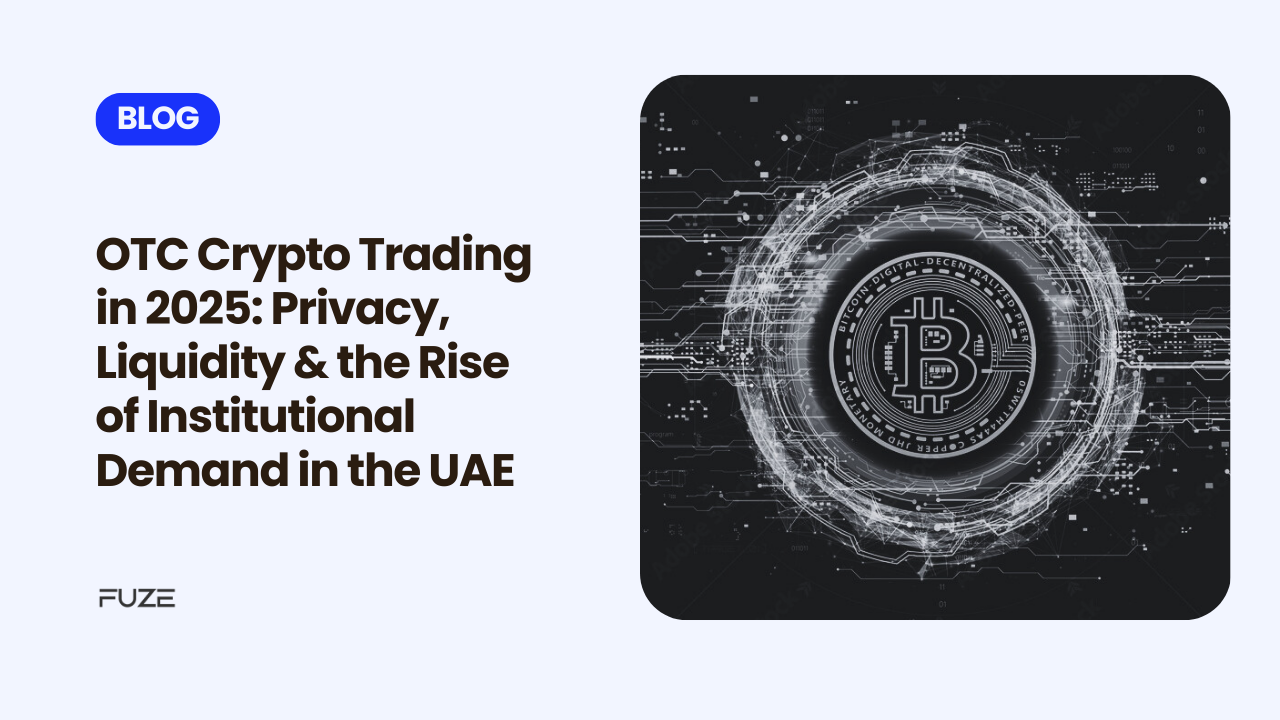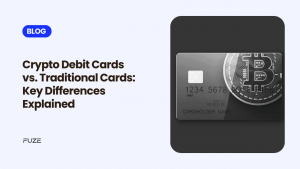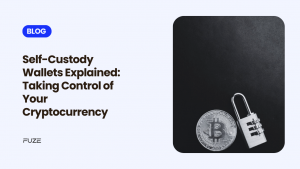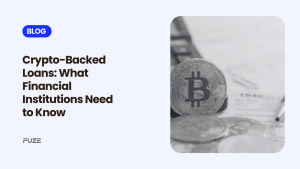Over-the-counter (OTC) crypto trading refers to the direct exchange of digital assets between two parties, outside of public exchanges. These trades are facilitated by brokers or specialized desks that connect high-volume buyers and sellers, providing privacy, speed, and customization.
While OTC trading has existed since the early days of Bitcoin, the landscape in 2025 looks very different. What began in the 2010s as informal deals among miners and early crypto adopters has now matured into a fully regulated, institutionally-driven market. Today, regulated OTC desks operate under robust compliance frameworks, with a growing number of them based in hubs like Dubai, Singapore, and Hong Kong.
With a surge in institutional participation, demand for tailored execution strategies, and the tightening of regulatory frameworks, OTC trading is no longer just a backchannel, it’s a core pillar of digital asset market infrastructure.
Trends Driving OTC Crypto Trading
1. Institutional Allocation Is Accelerating
2024 saw a record influx of institutional capital into crypto markets, with BlackRock’s Bitcoin ETF approval in the U.S. triggering a broader wave of legitimacy. In Q1 2025, OTC desks around the world saw a notable surge in institutional trading activity. The majority of these trades are executed away from public exchanges to avoid slippage, protect strategy, and meet regulatory requirements.
2. UAE Emerges as an OTC Powerhouse
The UAE, particularly Dubai and Abu Dhabi, is rapidly becoming a hub for regulated OTC crypto services. With VARA (Virtual Assets Regulatory Authority) and ADGM (Abu Dhabi Global Market) laying down clear digital asset frameworks, institutional desks now have the regulatory clarity to operate with confidence.
3. Stablecoins and CBDCs Changing the Game
A large share of OTC trading is now done using stablecoins like USDC, USDT, and EURC, particularly for settlements across time zones and jurisdictions. OTC desks are also exploring integration with CBDCs, which is expected to reshape local liquidity and settlement once launched.
OTC vs. Traditional Exchanges – Why it Still Matters
On traditional crypto exchanges, large buy/sell orders are public, leading to front-running, slippage, and poor execution. OTC desks, on the other hand, provide discretion and block liquidity. It’s the difference between bidding on a Picasso in a public auction and closing the deal in a private viewing room.
In 2025, this matters more than ever. With rising institutional inflows and crypto adoption across sovereign wealth funds, hedge funds, and private banks, the need for stealth execution has become a competitive edge.
Types of OTC Trading in 2025
- Bilateral Trading
Still relevant for ultra-high-value, relationship-based trades. These are now often backed by legal agreements, custodial controls, and regulated third-party escrow services.
Example: A sovereign fund executing a $100M Bitcoin position split over multiple settlements. - Broker-Facilitated OTC
The most common OTC model. Brokers match buyers and sellers, handle counterparty checks, and execute trades.
In Dubai, most major OTC desks now hold VARA or ADGM licenses, enabling AED/USDT, BTC/AED, and other popular pairs. - Automated OTC Platforms
In 2025, platforms have scaled globally, and UAE-regulated platforms are catching up. Automation is allowing faster execution, though complex deals still require human negotiation.
Why Trade Through OTC Desks Today?
- Reduced Market Impact: Avoid slippage and front-running.
- Customized Settlements: Fiat, stablecoins, or CBDCs, the choice is yours.
- Privacy & Discretion: No order books, no leaks, no public footprint.
- Advisory & Market Intel: Traders get expert guidance on timing, liquidity sourcing, and pricing.
- Compliance First: UAE-regulated desks ensure full KYC/AML, safeguarding both parties.
OTC in the UAE: What to Look For in 2025
As the region matures, choosing the right OTC desk means looking beyond just pricing. Key considerations include:
- Regulatory Status: VARA (Dubai), ADGM (Abu Dhabi), or DFSA (DIFC) authorization.
- Local Liquidity: Ability to settle in AED or other stablecoins.
- Security Infrastructure: Cold storage, multi-sig wallets, and secure banking rails.
- Reputation & Track Record: Years in market, high-profile deals, and client testimonials.
OTC Use Cases in 2025
- Family Offices & HNIs hedging or allocating into crypto discreetly
- Crypto Treasuries managing stablecoin reserves across borders
- Fintech & Remittance Platforms sourcing on-chain liquidity at scale
- Miners & Validators converting large crypto holdings into fiat or stablecoins
Final Word: A Strategic Lever for the Next Phase of Crypto
OTC crypto trading is no longer niche. It’s a fundamental mechanism for global crypto liquidity and in markets like the UAE, it’s growing faster than ever.
At Fuze, we support regulated, secure, and high-touch OTC services for clients looking to move size, whether in Bitcoin, stablecoins, or fiat. With licensed desks and local rails, our team ensures privacy, compliance, and deep liquidity for every transaction.
Interested in trading crypto OTC in the UAE? Let’s talk.
Contact us to learn more about how Fuze OTC services can support your treasury, trading, or investment needs.
Disclaimer: Virtual assets carry significant risks, including high volatility and potential loss of your entire investment. They are not backed by governmental protections, and recourse may be limited in case of loss. Always assess your risk tolerance, fully understand the risks, and seek independent financial advice if needed before investing.
Frequently Asked Questions
- What is OTC crypto trading and who is it for?
OTC (Over-the-Counter) crypto trading allows two parties to trade digital assets directly, bypassing public exchanges. It’s ideal for institutional investors, high-net-worth individuals, and entities executing large trades discreetly without moving market prices. - How is OTC trading different from using a crypto exchange?
Unlike exchanges with visible order books, OTC trades are private and off-market, preventing slippage and market impact. OTC desks also offer personalized service, better pricing for large blocks, and tailored settlement options. - Is OTC crypto trading regulated in the UAE?
Yes. Reputable OTC providers in the UAE operate under regulatory frameworks. It’s essential to choose a licensed and compliant provider. - What assets can I trade OTC?
You can trade major cryptocurrencies like Bitcoin and Ethereum, stablecoins like USDT and USDC, and even less liquid altcoins depending on the OTC desk’s liquidity network and counterparties. - Why should I choose an OTC desk like Fuze?
Fuze offers institutional-grade execution, deep liquidity, faster settlement, and full regulatory compliance in the UAE. With personalized support and seamless trade execution, we simplify large-volume crypto trades end-to-end.







